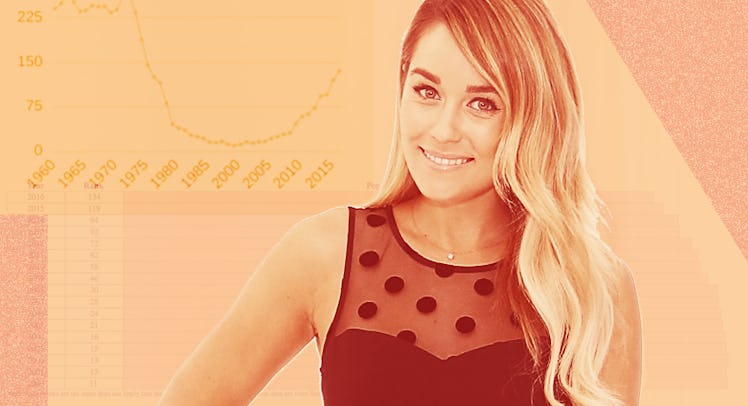I Was A Part Of The Lauren Boom And Bust Of The ’80s And ’90s
The name Lauren peaked in popularity in 1989 before retreating into relative obscurity.

Most parents strive to name their children something unique and yet not entirely alienating — which means striking a balance between trends and trailblazing. My name is Lauren. True, it’s not so bad as far as names go. Lauren is Latin for “of Laurentum,” or “from the place of the laurel leaves” and, indeed, I am more prone to rolling in foliage than several non-Laurens in my acquaintance. Yet, Lauren may as well be Latin for “born in the mid- to late-1980s.”
READ MORE: The Fatherly Guide to Baby Names
Because I was born at the center of the great Lauren boom and bust.
The name Lauren was popularized by Lauren Bacall (my father was so sold on this point that, growing up, I had a teddy bear named “Lauren Bearclaw”). Bacall made her film debut in 1944, opposite future husband Humphrey Bogart, and maintained an impressive career well into the ’90s. Named the 20th greatest female star of Classic Hollywood cinema by the American Film Institute, Bacall inspired parents to create a cat-eyed, husky-voiced, Lauren Boom.
The popularity of the name Lauren shot up from rank 267 in the U.S. to #9 at its peak in 1989, according to data from the Social Security Administration. I was born in 1985, a good year to be a Lauren. My name ranked 15th overall, and still had its best days ahead. Growing up amidst the Lauren Boom, I learned to respond only to my surname in class (there were simply too many Laurens). As of 2016, Lauren is less popular, ranking closer to 134. It’s easier to find a baby Scarlett than a baby Lauren — and perhaps that makes sense, given celebrity culture.
Still, being a Lauren isn’t a bad thing. Derived from the name Laurence, Lauren is regarded as less feminine than other traditionally female names, and research shows that matters. One study, published in the Journal of Human Resources, found that Laurens were more likely to be attracted to math and science — subjects typically regarded as “masculine” — than those born with more feminine names like Anna, Emma, or Elizabeth. Other research suggests that Laurens are more likely to become lawyers, a claim bolstered by Urban Dictionary‘s definition of Lauren as “extremely smart, nice to everyone, loyal to her friends, patient, but also not afraid to put her foot down” (thanks, anonymous submitters). In many ways, Lauren is the Goldilocks name of labels. It’s not too masculine, not too feminine. It’s just right.
Lauren is also the product of a very specific cultural shift in the U.S. Popular names like Michael and Elizabeth have remained on top since the 1960s, so the rise and fall of Lauren is distinct. Sure, it’s probably not the only name to experience such a swell, but the originality of being a Lauren is more subtle than others because it’s not about the name at all. It’s about the character behind it. Our namesake Lauren Bacall said it best: “I am not a has-been. I am a will be.”
Lauren will rise again. Until then, Laurens don’t really give a shit what you think of our name.
This article was originally published on